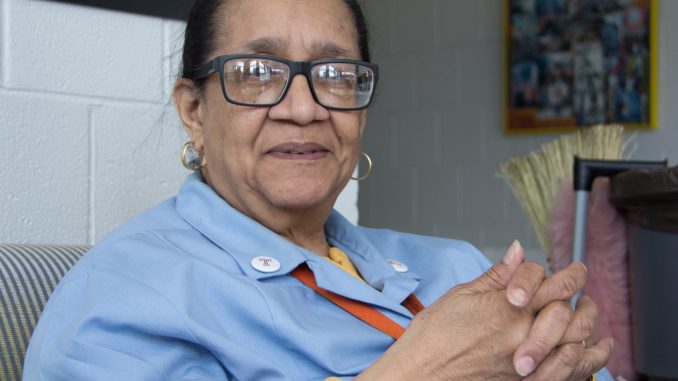
Guadalupe Portillo has never been to Lincoln Financial Field, but she can imagine the amount of trash left behind after games.
She’s worried she’ll learn firsthand just how much trash football fans can produce if a stadium is built near her block.
“You gotta think about it,” Portillo said. “[Problems off-campus] are overwhelming as it is now, can you imagine what it would be like with a stadium?”
Portillo, 70, lives on Norris Street near Broad and has been working in Temple’s Facilities Management department for 21 years. She also lives near the proposed stadium site the Board of Trustees recently approved for a feasibility study, which is being conducted by Ohio-based architecture firm Moody Nolan.
Curtis Moody, President and CEO of Moody Nolan, told The Temple News he and his team will be coming to the stadium site every other week and will meet with some community members on each trip. Portillo was one of a few community members able to discuss her concerns with Moody at one of the meetings about a month ago.
Moody said during its trips to Main Campus, the architecture team takes campus and neighborhood tours by walking the streets to analyze the issues community members in the area already face. University officials have taken Moody and his team on Friday night walking tours to see weekend environments.
“We’re still listening [to community members],” Moody said. “We’re going to outline to the university some of our findings. Part of our strategy is not just to come up with an architectural concept independent of the issues that might not be architectural issues but nonetheless, issues.”
“So we’re going to do both,” Moody added. “We’re going to do our homework on what can we do to enhance the environment given the concerns that we’re hearing and that’s the goal.”
Moody said community meetings are being set up through the president’s office.
Moody’s team has heard concerns from Portillo and other community members that most commonly include noise, trash, traffic and parking. These are all aspects that Moody said he will address in a comprehensive study that his firm will provide to the Board of Trustees at the end of the feasibility study.
Moody said the study is estimated to be completed by the end of the summer, taking a total of three to four months.
Distrust between the community and University still continue, despite community meetings. Joan Briley, who is the block captain for the 1500 block of Norris Street—and whose house is right across the street from the proposed stadium site—met with Portillo, Moody’s team and other community members.
“We don’t trust [the university] because of how things have been done,” Briley said. “We told [Moody], ‘You don’t live here. You don’t see what we’re going through.’”
Briley and Portillo both said Moody listened to and wrote down all of their concerns at last month’s meeting.
“He was really listening to what we’re saying,” Briley said. “I hope he took heed in what we were saying.”
“We do believe that some of these things will be needed to be addressed regardless if they ever build anything on those sites,” Moody said. “Hopefully what comes out of this [feasibility study] will be greater discussion between the students, faculty community and university officials on what should happen [off campus].”
Gillian McGoldrick can be reached at gillian.mcgoldrick@temple.edu or on Twitter @gill_mcgoldrick.


Be the first to comment